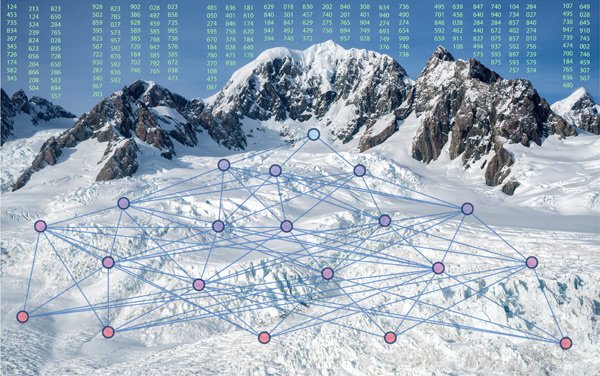Artificial intelligence helps scientists to better predict the evolution of glaciers under climate change
Publication in Nature Communications
For the first time, a research team has used deep learning – a type of artificial intelligence – to simulate the future evolution of glaciers at a regional scale. Glaciers do not evolve in a constant manner through time. The ability to capture these so-called nonlinear effects is one of the main advantages of deep learning, compared to the classic models currently used. The researchers published their results this week in Nature Communications.
Glaciers are rapidly losing mass as a consequence of human-induced climate change. In order to anticipate the future of glaciers and their impact on sea level rise, water resources and ecosystems, it is important to properly understand the physical processes behind these regional and global changes. Scientists use numerical models to simulate glacier evolution in a simplified manner for whole regions or even the entire world, for both past and future periods of time.

New generation of scientific models
In the new study, an interdisciplinary team of glaciologists, climatologists and mathematicians from Université Grenoble Alpes, INRAE, Utrecht University, Météo-France, Université Libre de Bruxelles and TU Delft, applied deep learning to simulate the future evolution of glaciers at a regional scale. This marks a new generation of scientific models better equipped to predict the fate of glaciers under climate change.
Important consequences
These results have important consequences for our understanding of the future evolution of glaciers and sea level rise. After the Antarctic and Greenland ice sheets, glaciers in the Arctic and Patagonia host the largest ice reserves in the world. According to this study they will be the most affected regions by this nonlinear response to global warming. This calls for a revision of current predictions, adjusting glacier models to correctly take into account these complex processes. Artificial intelligence, combined with knowledge on the physics of glaciers and climate, will play a very important role in future discoveries.
Publication
Nonlinear sensitivity of glacier mass balance to future climate change unveiled by deep learning
Jordi Bolibar, Antoine Rabatel, Isabelle Gouttevin, Harry Zekollari and Clovis Galiez
Nature Communications, 20 januari 2022, DOI 10.1038/s41467-022-28033-0

